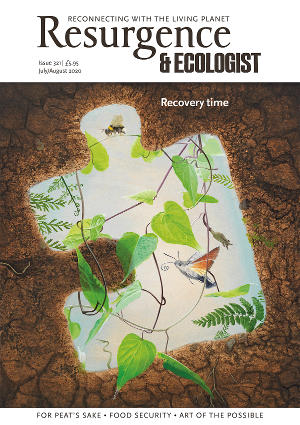It feels bitter-sweet to be reading about the salve that the natural world can apply to our minds while on lockdown. Thanks to coronavirus, there is little prospect of venturing into the great outdoors any time soon, but at least it is soothing to read about the transformative encounters experienced by two writers, Lucy Jones and Isabel Hardman. Yet it’s clear from their recently published books that Nature is not a luxury. Flowers, lakes, horses, hills: these wonders not only make us happy – they can also prevent us from spiralling into madness. Already I am craving the beaches and bluebell woods that I would usually be enjoying at this time of year.
In her forthright book The Natural Health Service, Hardman explains that she started describing herself as “mad” – usually used pejoratively – to distinguish her real personality from the mental illness that has recently dominated her life and mind. Best known as a political journalist, Hardman lives with post-traumatic stress disorder, after experiencing an event so bad that it makes “the fists of family members clench with horror”. Her book describes how Nature helped her to deal with the terrifying symptoms of this illness.
But The Natural Health Service is not really a memoir. Hardman’s real interest is in examining the science behind the idea of a Nature cure – does Nature really have the potential to haul us out of our darkest moments? This is far from a new idea, and there is plenty of information available to read online about the restorative power of the Earth – the pleasures of a country walk or watering house plants as self-care – but Hardman knows from first-hand experience that mental health can be gritty and painful, and her book is really a no-nonsense enquiry into whether Nature truly has the power to complement pills in cases of severe mental illness.
Jones approaches a similar subject from the starting point of her own battles with alcoholism, although her concern for her daughter growing up in a Nature-depleted world also shapes her thinking. Losing Eden is a forensic examination of how our minds are entwined with the wild. The science backing this notion is covered exhaustively: we learn in depth why soil can help make us happy, and how a sense of awe can resculpt our brains into less selfish entities.
This sense of wonder at the natural world suffuses Losing Eden. Where Jones is not chatting to scientists, she is rhapsodising over the beauty and messiness of the natural world. It is a book born of love for the Earth itself, rather than of what the Earth can do for humans (a way of thinking encapsulated by the term ‘ecosystem services’, which, for Jones, is a “stinker” of a phrase). This is a book worth reading for its Nature writing alone, which is not elegant so much as sprawling with the noise and chaos that the author clearly treasures. We are losing an abundance of wonder, she writes: “The adorable, terrible, leaky, stinky, gooey, glimmery, furry, bloody, swoony, shimmery, thumping majesty of the Earth.”
While Hardman and Jones cover a lot of the same material – some well-known scientific papers crop up in both books, for instance, and both are interested in how social inequalities can hinder access to Nature – the two writers approach the subject with different priorities, and both are pursuing noble causes that are evidently dear to them. Hardman, who has long campaigned to improve mental health services, places the clinical benefits of Nature front and centre. She has an anthropocentric view of the world, where fells exist to be hiked, horses to be ridden, and lakes to be swum (even when they are covered in ice). No book that deals with Nature can ignore the devastating decline in biodiversity that has taken place in recent decades, and Hardman deals with this swiftly and convincingly, but it is the numerous discussions that she recounts with people living with mental disorders – and her own journey towards recovery – that form the emotional heart of The Natural Health Service.
Losing Eden, as the title suggests, has the loss of Nature itself at its core. Jones takes the approach of a conservationist, looking to preserve the landscapes she encounters not only for the balm they apply to our harried minds, but also for the sake of the landscapes themselves. The connection she describes to the natural world is more spiritual than that described by Hardman, who expends a fair amount of ink on avoiding any accusations of sentimentality. Jones, on the other hand, when swimming off a secluded cove in Scotland, feels herself “part of the earth, the rocks and the ocean”. This affinity for a disappearing world allows her to deal adeptly with one of the central tensions surrounding the notion of a Nature cure: how do you take solace from a world that is increasingly bearing the marks of humanity’s abuse and misuse? As the Earth is depleted, Nature bestows grief as well as peace.
The Natural Health Service and Losing Eden both add credibility to the idea of the Nature cure. The biology is convincing, and Hardman in particular strengthens the case by demonstrating where science backs the claims, where the benefits are largely anecdotal, and where more research is needed, even devoting a chapter to the question of whether Nature is simply a placebo that soothes our souls only because we’ve been sold on its benedictions for so long. But both writers are also clear that the advantages are not just down to the chemical magic of fresh air and cold water, but also from the psychological and social boost that humans receive by creating communities and watching tiny seeds grow from seemingly nothing. It is a hackneyed metaphor, for sure – but it is one that could save lives.







